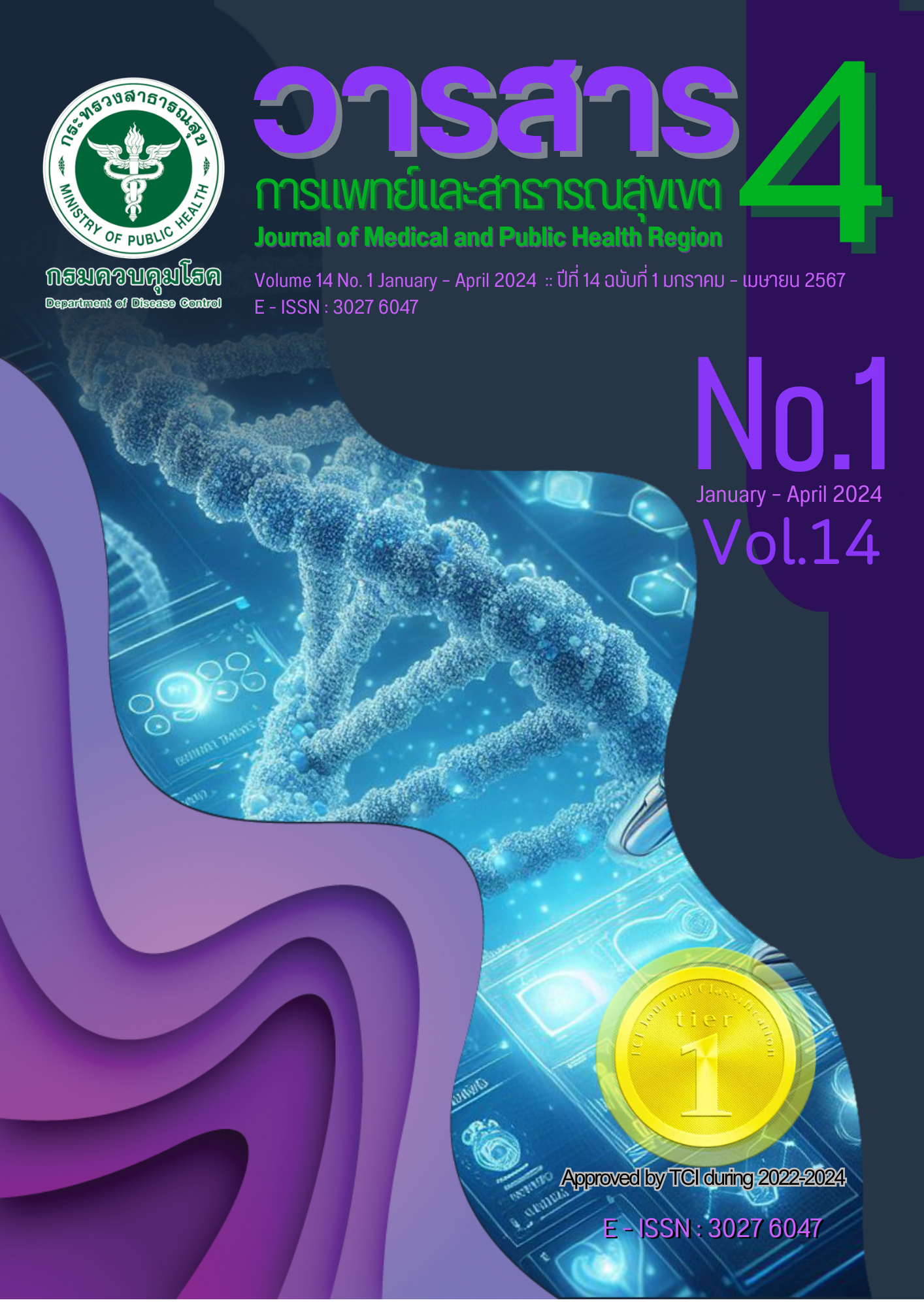Health literacy in COVID-19 prevention and healthcare service accessing for homeless at Khet Phra Nakhon, Bangkok, Thailand
Main Article Content
Abstract
This qualitative research was based on data theory (grounded theory method). The objectives were to evaluate health literacy in COVID-19 prevention and healthcare service access for homeless people. There were 28 participants from Homeless Service Providers and homeless who living in public areas at Khet Phra Nakhon, Bangkok. Data were collected in April 2023 and analyzed using thematic analysis. The study results revealed that the majority of homeless individuals possess health literacy in understanding of COVID-19 prevention measures. They stated that wearing face masks can effectively prevent COVID-19. However, they still have limited understanding regarding disease transmission and the symptoms of
COVID-19. Regarding healthcare service access for COVID-19 prevention, one in three homeless individuals has not received the COVID-19 vaccine, citing reasons such as personal strength and they still lack confidence in the effectiveness of the vaccine. Therefore, the government and relevant organizations should strive to educate homeless individuals about COVID-19 by engaging with them directly in the areas where they reside. This should include providing proactive healthcare services such as COVID-19 screening, including antigen testing kit, and administering COVID-19 vaccinations in order to ensure comprehensive access to healthcare services for homeless individuals.
Article Details

This work is licensed under a Creative Commons Attribution-NonCommercial-NoDerivatives 4.0 International License.
References
World Health Organization. WHO Coronavirus (COVID-19) Dashboard [Internet]. 2023. [cited 2023 May 16]. Available from: https://covid19.who.int/.
Department of Disease Control Ministry of Public Health (TH). The Coronavirus disease 2019 situation. 2023 [cited 2023 May 16]. Available from: https://ddc.moph.go.th/covid19-dashboard/. (in Thai)
Wuttayakorn T, Sithisarankul P. Risk factors for COVID-19 infection. Journal of Preventive Medicine Association of Thailand 2021; 11(2): 446-64. (in Thai)
Ralli M, Arcangeli A, Ercoli L. Homelessness and COVID-19: Leaving no one behind. Ann Glob Health 2021; 86(1): 11.
Ministry of Public Health (TH). Notification of the Ministry of Public Health RE: Designation and main symptoms of communicable diseases under surveillance (Issue 3), 2022. Ratchakitchanubeksa No.139; 223. (Sep 20, 2022). (in Thai)
Tucker JS, D'Amico EJ, Pedersen ER, Garvey R, Rodriguez A, Klein DJ. Behavioral health and service usage during the COVID-19 pandemic among emerging adults currently or recently experiencing homelessness. J Adolesc Health 2020; 66(4): 603-5. doi:10.1016/j.jadohealth.2020.06.013.
Visetpricha B. Health risk perception of homeless people during COVID-19 pandemic and their basic needs. Journal of Anthropology, Sirindhorn Anthropology Centre 2022; 5(1): 209-51. (in Thai)
RalliI M, Cedola C, Urbano S, Morrone A, Ercoli L. Homeless persons and migrants in precarious housing conditions and COVID-19 pandemic: peculiarities and prevention strategies. Eur Rev Med Pharmacol Sci 2020; 24(18): 9665-6.
16. Meehan A A, Aarvig K, Kashani M, Whitton A, Mosites E. COVID-19 vaccine acceptability among people experiencing homelessness in central Florida and Southern Nevada, March-June 2021. J Public Health Manag Pract. 2022; 28(6): 693-601.Perri M, Dosani N Hwang S W. COVID-19 and people experiencing homelessness: challenges and mitigation strategies. CMAJ 2020; 192(26): E616-E619. doi: 10.1503/cmaj.200834.
Paudyal V, Racine M, Hwang SW. COVID-19 vaccination amongst persons experiencing homelessness: practices and learnings from UK, Canada and The US. Public Health 2021; 199:e2-e3. doi: 10.1016/j.puhe.2021.08.015.
Sorensen K, Van den Broucke S, Fullam J, Doyle G, Pelikan J, Slonska Z. Health literacy and public health: a systematic review and integration of definitions and models. BMC Public Health 2012; 12: 80. doi: 10.1186/1461-2458-12-80.
Kaeodumkoeng K, Junhasobhaga J. A development and testing of health literacy on disease prevention and control assessment form for public health officers. Romphruek Journal. Krirk University. 2021; 39(2): 193-220.
Levesque JF, Harris MF, Russell G. Patient-centred access to health care: conceptualising access at the interface of health systems and populations. Int J Equity Health. 2013; 12: 18.
Thorndike AL, Yetman, HE, Thorndike AN, Jeffrys M, Rowe M. Unmet health needs and barriers to health care among people experiencing homelessness in San Francisco's Mission district: a qualitative study. BMC Public Health 2022; 22(1): 1061. doi:10.1186/s12889-022-13499-w.
Kuhn R, Henwood B, Lawton A, Kleva M, Murali K, King C, Gelberg L. COVID-19 vaccine access and attitudes among people experiencing homelessness from pilot mobile phone survey in Los Angeles CA. PLOS One 2021; 16(6): e0255246. doi: 10.1361/ journal.pone.0255246.
Meehan A A, Aarvig K, Kashani M, Whitton A, Mosites E. COVID-19 vaccine acceptability among people experiencing homelessness in central Florida and Southern Nevada, March-June 2021. J Public Health Manag Pract. 2022; 28(6): 693-701.
Chamchan D. Development of the COVID-19 vaccine service in the 608 population Chonsomboon health promoting hospital, Nongmuang district, Lopburi province. Journal of Medical and Public Health Region 4. 2023; 13(1): 20-30. (in Thai)


